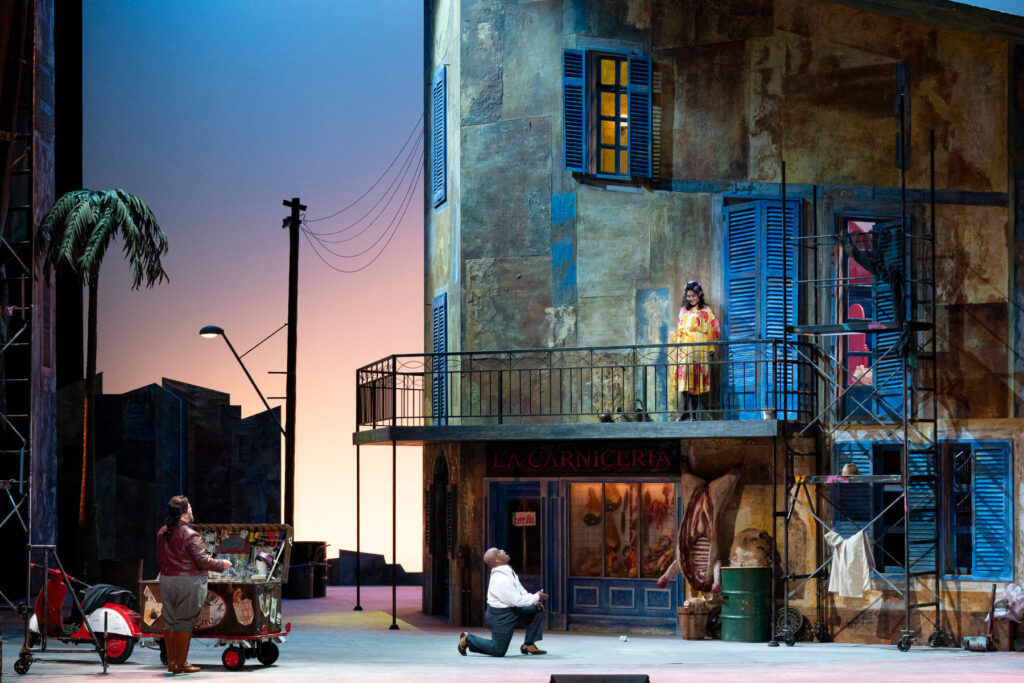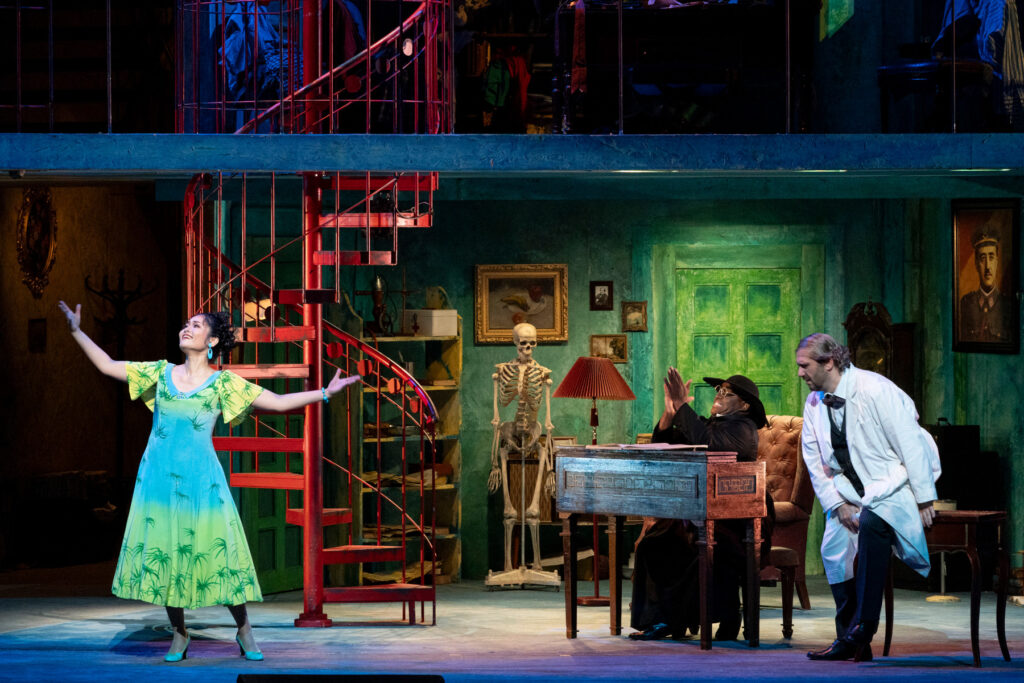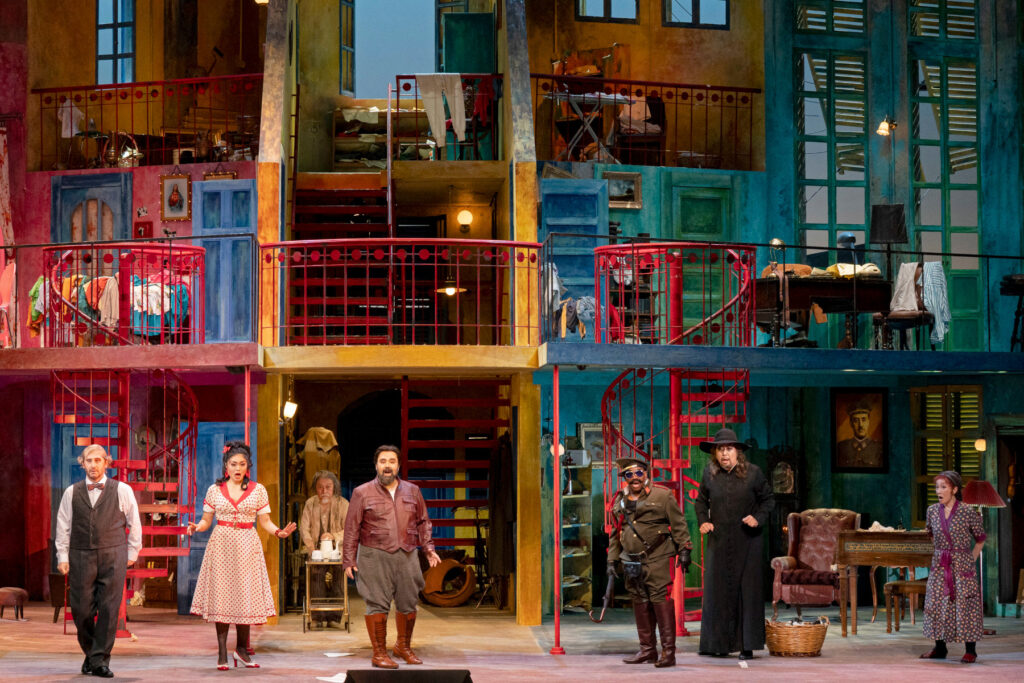Josef E. Köpplinger’s 2005 production of Rossini’s Il barbiere di Siviglia celebrated its fifth revival in Tokyo this year. At the matinee on June 1st, the NNTT was filled with a somewhat younger and less formally attired audience than usual. There was a palpable sense of “Let’s enjoy this light-hearted comedy together” in the air, creating a marked contrast to other performances, where a more serious mood of anticipation has predominated.
Based on Beaumarchais’s four-act play Le Barbier de Séville (1775), Rossini’s opera has never lost its appeal since its premiere in Rome in 1816. In Köpplinger’s modern adaptation, set in 1960s Spain during the Franco regime, the barber-surgeon Figaro enters the stage on a scooter, followed by a gang of children. The singing teacher, Don Basilio, appears riding a bicycle, resembling Father Brown from G. K. Chesterton’s mystery novels. Doctor Bartolo, Rosina’s miserly old guardian, takes phone calls from New York in his office within the rotating set, while Berta, his housekeeper, is forced to run a brothel on the side. By shifting the time period of the story, Köpplinger aims to illustrate how this work represents “a passionate era preceding a social revolution” (Production Note), with varying effects.

The cast was admirable. As Conte d’Almaviva, American tenor Lawrence Brownlee – who performed the same role here in 2006 – impressed with his soft, stable, and remarkably elastic voice. Looking slightly more boyish and naïve than the typical portrayal of this amorous aristocrat, Brownlee’s Almaviva elicited the audience’s sympathy at every turn. His passionate cavatina, “Ecco ridente in cielo,” and his ardent canzone, “Se il mio nome saper voi bramate,” were especially enchanting.
Tokyo-born, Europe-based mezzo Aya Wakizono brings a resonant voice to Rosina, her signature role, which she performed in the 2020 revival. A worthy disciple of Mariella Devia, she delivers each note with astonishing naturalness. Dressed in a colourful A-line dress with matching high heels, her Rosina moves confidently around the stage, determined to find happiness with her chosen lover. She exudes far more wit, spirit, and vitality than any of the male characters. Her famed cavatina, “Una voce poco fa,” sung in a wonderfully mellow voice with superb agility, earned thunderous applause. She was equally excellent in numerous ensembles.

As Bartolo, Italian baritone Giulio Mastrototaro was an absolute delight. Clad in a traditional grey three-piece suit and an amusing wig, he masterfully performed this challenging role, skilfully using vocal inflection and tempo, with a subtle touch of humour woven into his expression – an outstanding house debut.
The veteran Rossinian baritone Roberto de Candia, who first sang Figaro at the NNTT back in 2002, still exhibited his commanding presence. His iconic cavatina, “La ran la lera,” sung while surrounded by a band of street children, fully satisfied the expectant audience.
Elsewhere, Masanao Takahashi made a fine Fiorello in the opening scene. Hidekazu Tsumaya’s Don Basilio and Etsuko Kanoh’s Berta were pleasantly sung, enriched with plenty of comical gestures.

In the pit, Corrado Rovaris delivered a light yet elegant interpretation of Rossini. The neat, precise performance on the cembalo deserves special mention. As always, the male singers from the New National Theatre Chorus provided powerful support. Overall, it was a delightful production – perfect for a Sunday afternoon.
Natsuko Hirakura
Il barbiere di Siviglia
Opera buffa composed by Gioachino Rossini
Libretto by Cesare Sterbini
Cast and production staff:
Il Conte d’Almaviva – Lawrence Brownlee; Rosina – Aya Wakizono; Bartolo – Giulio Mastrototaro; Figaro – Roberto de Candia; Don Basilio – Hidekazu Tsumaya; Berta – Etsuko Kanoh; Fiorello – Masanao Takahashi; Un Ufficiale – Ken Akimoto; Ambrogio – Kazuhiko Furukawa
Conductor – Corrado Rovaris; Production – Josef E. Köpplinger; Set and Costume Design – Heidrun Schmelzer; Lighting Design – Maki Yagi; Revival Director – Maki Uebaru
New National Theatre Chorus, Tokyo Philharmonic Orchestra
New National Theatre Tokyo, Sunday 1st June 2025
All photographs © Rikimaru Hotta